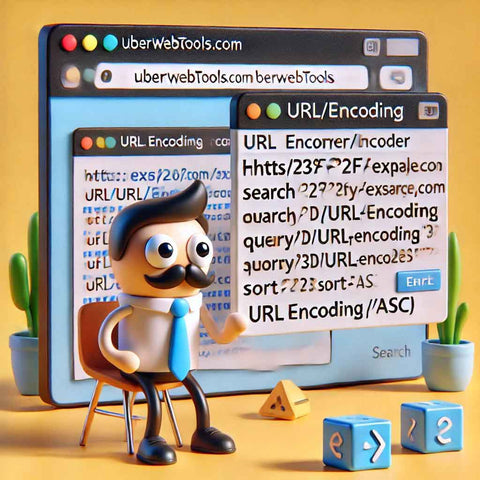Why You Need a URL Encoder/Decoder Tool and How It Solves Common Web Issues
URL Encoder or Decoder tools are essential for anyone who works with URLs regularly. This tool simplifies the complex process of encoding and decoding URLs to ensure they are compatible across web platforms. Whether you’re a developer, marketer, or simply managing website content, an online URL encoder is invaluable. This article explores why URL encoding and decoding are so important and how a URL encoder online can help you resolve common URL issues.
Understanding URL Encoding and Decoding
What is URL Encoding? URL encoding is the process of converting special characters in a URL into a format that can be safely transmitted over the internet. For example, a space becomes %20, ensuring it doesn’t interfere with the URL structure. An URL encoding tool allows you to do this seamlessly, helping maintain the integrity of URLs.
What is URL Decoding? Decoding converts the encoded URL back to its original, human-readable format. A URL decoder tool makes this process easy, especially for troubleshooting and managing URL parameters.
How Encoding and Decoding Differ: Encoding prepares URLs for safe transmission, while decoding makes them readable and accessible, each serving a distinct role in web communication.
Why Use a URL Encoder/Decoder Tool?
- Ensuring Data Integrity: Encoding removes ambiguities in URLs by replacing special characters, which a URL encoding utility can handle quickly.
- Enhanced Web Compatibility: Encoding ensures that URLs work on all platforms, preventing misinterpretations that can cause broken links.
- Security Benefits: URL encoding can protect against vulnerabilities, such as XSS attacks, by sanitizing links, ensuring safer online interactions.
Key Reasons to Encode URLs
- Handling Special Characters: Special characters like spaces, question marks, and ampersands can disrupt URLs, but encoding solves this by transforming them into a safe format.
- Preserving URL Structure: Encoding ensures the intended URL structure remains intact, reducing the chance of unintended truncation or splitting.
- Data Transmission Consistency: Encoding ensures uniform data transmission, maintaining accuracy between client and server.
Key Reasons to Decode URLs
- Making URLs Human-Readable: Decoding restores URLs to their original format, making them easier to interpret, especially when viewing or analyzing content.
- Accessing Embedded Content in URLs: Decoding can reveal encoded parameters, user data, or API calls that are often hidden.
- Debugging and Troubleshooting: Decoding helps developers and marketers troubleshoot URLs, ensuring they perform as intended.
Real-World Use Cases for URL Encoding and Decoding
- APIs and Webhooks: When sending requests to APIs with query parameters, encoding ensures data is properly interpreted, essential for accurate results.
- E-Commerce and Dynamic Links: E-commerce sites use encoded URLs for product IDs, sessions, and tracking, making URL encoding essential for data integrity.
- Social Media and Sharing Links: Encoding allows links shared on social platforms to work universally, preserving tracking codes.
- Email Marketing: In email marketing, URL encoding enables links to work without errors, preserving crucial tracking data for analytics.
Common Problems with URLs That Aren’t Encoded or Decoded Correctly
- Misinterpreted Characters: Special characters can break URLs or misdirect users, leading to 404 errors if not properly encoded.
- Security Risks: Unencoded URLs are vulnerable to security issues like XSS attacks, posing risks to users and data.
- Data Integrity Loss: Critical data may be lost if URL encoding is skipped, leading to incomplete or inaccurate transmissions.
- SEO Impact: Broken URLs due to encoding issues can harm SEO, resulting in lower rankings and reduced user satisfaction.
How to Use a URL Encoder/Decoder Tool Effectively
- Encoding URLs for SEO and Sharing: Encoding URLs before sharing on websites or social media ensures they work seamlessly across all platforms.
- Decoding URLs for Analysis: Decoding URLs from analytics or tracking tools helps reveal referral paths and query parameters.
- Quick Access Tips: Using a URL encoder or decoder tool for daily tasks can enhance productivity, especially for developers, web admins, and marketers.
Benefits of Using an Online URL Encoder/Decoder Tool
- Fast and Convenient: An online tool provides quick encoding and decoding without complex software.
- Cross-Platform Compatibility: An online URL encoder ensures URLs work correctly across different browsers, email clients, and social media.
- Productivity Enhancement: A URL Encoder/Decoder tool simplifies troubleshooting, saving time and enhancing work efficiency.
And there you have it...
URL encoding and decoding are fundamental in web management. Whether it’s for handling query parameters, preventing broken links, or safeguarding against security vulnerabilities, a reliable URL Encoder/Decoder tool is a must-have for anyone working with URLs. Try our URL Encoder/Decoder tool today and make it part of your web toolkit to ensure smooth URL handling.







